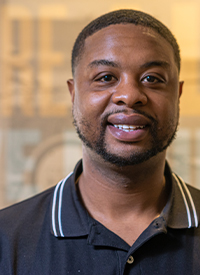A Conversation with TEDD HARDY

Tedd Hardy
Tedd Hardy is the founder of the community social enterprise, No Days Off (NDO). From partnerships with Visit Indy to GANGGANG, NDO is changing the landscape of building authentic relationships with the community. We sat down for a conversation to talk about the work so far and the plans for the future.
What does No Days Off mean to you and how did it start?
TEDD – So at first, people thought it meant I was up all day working all night, no sleep, grinding all day. But no days off to me, it was like bringing things together, getting better every day, learning new things and then learning how to pass it on. So more people can, the way I do. So in this field, it’s equity and partnership together in the community. No Days Off has gone through different phases.
How does NDO impact our local communities and residents?
It took a while. People thought I was crazy. As I said, when they first saw No Days Off, it was like, go to sleep—you’re working too hard. And then they realized it was just more about daily improvement. It’s definitely made a big impact. I got to see that through the award we got for Belmont Beach. I’m starting to finally recognize that this year that it’s paying off when people are recognizing No Days Off and its impact.
So the goal of NDO is to work in the public interest to facilitate infrastructure investments and development projects that integrate social equality, through consulting, mentoring, programming & Partnerships. How do you feel that mission is ingrained into each of these projects you are a part of?
It’s instilled in my team members. Into board members. Into the community. We’re not giving up until the mission is complete. That’s really how it’s rubbing off the most. They see me if I’m not giving up and I’m not supposed to be somebody, then it’s just rubbing off on them. Like if he can do it, I can do it.
What does NDO look like in one year? Five years?
For my role, I’m going to be more into the consulting side instead of hands-on. Going more into communities advising on problem-solving—in schools, businesses, jails or whatever the organization is. We want to face it all.
When we think growth, what’s the balance of that growth coming from within the community and others coming in/becoming aware?
See, it’s definitely a balance. At first, I was just praying and yelling to get the park cleaned up. And then now I got all the attention that people want to invest in these communities. People do want to move people and make a change. I didn’t know it was going to come that way. And then the flip side, I got people in the community like “this is gentrification.” So you know, It went from people asking questions like who is this, who are they, they’re coming in our community.” Now it’s like, “oh, what’s up and we cleaned the park up.”
It’s balance. I think that answer is going to change in a year. It depends on your angle and how you look at the community and the real relationships being built WITH the community.
As social equity becomes more apparent to the public, how does NDO evolve to maintain collaboration, engagement, and sustainability?
I didn’t want to look at this as my opportunity to make some money. Like I wanted to take this opportunity and make a change while I can. It makes me go harder. Now that we do have some type of platform, I’m like let me get up here and show what I can do. So the people that I do uplift, it’s easier for the door to be open. It’s easier for you to write another story for a guy—that looks like me— that’s coming up after me. He can come into buildings like this and won’t scare everybody. To truly sustain these types of partnerships, I’m like let me do it right. And hopefully, some people listen and learn and take notes. People just need a starting point.
To support and learn more about No Days Off, email <email here>.






Leave A Comment